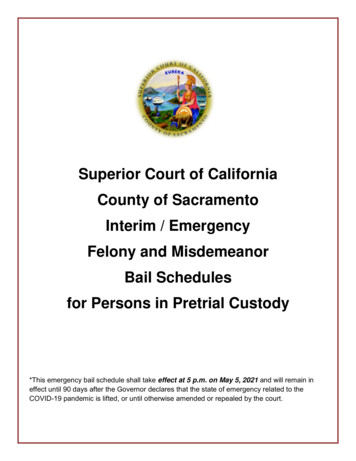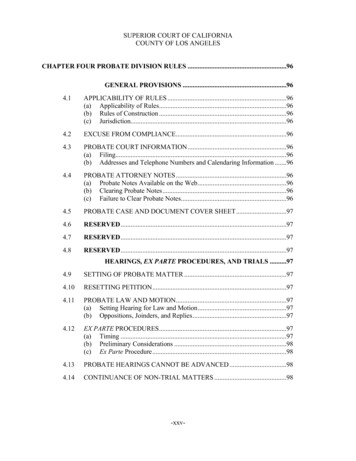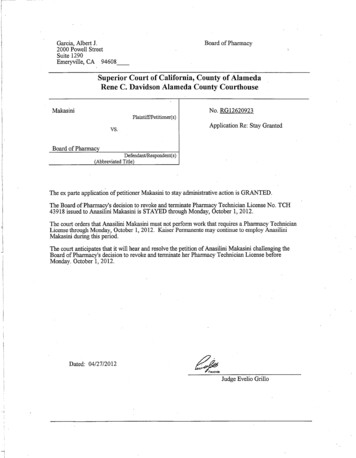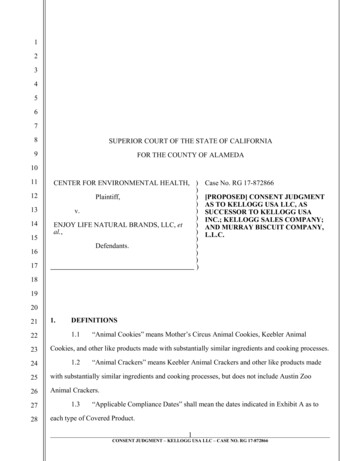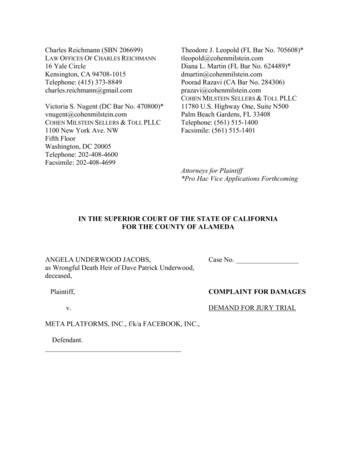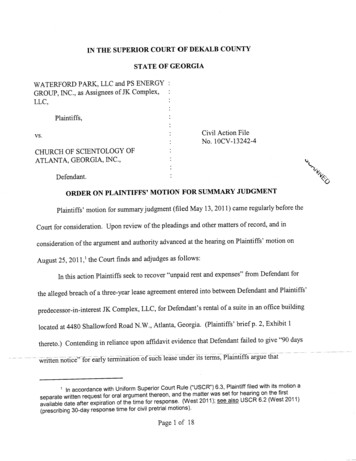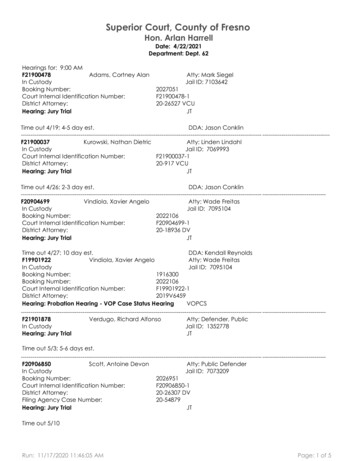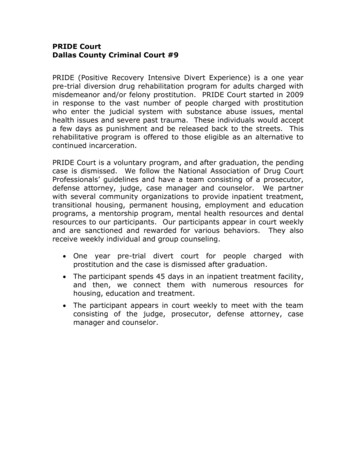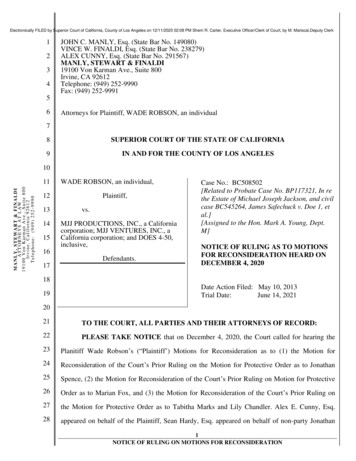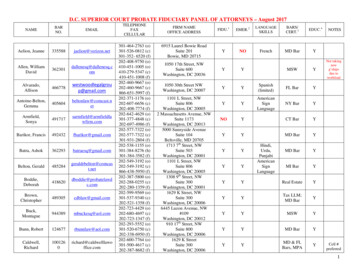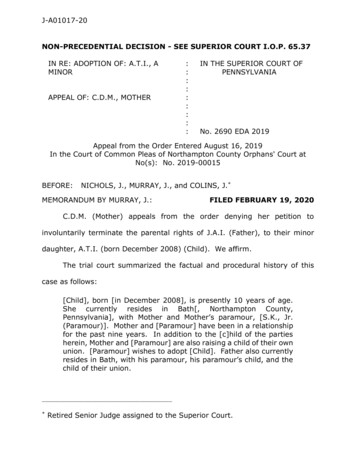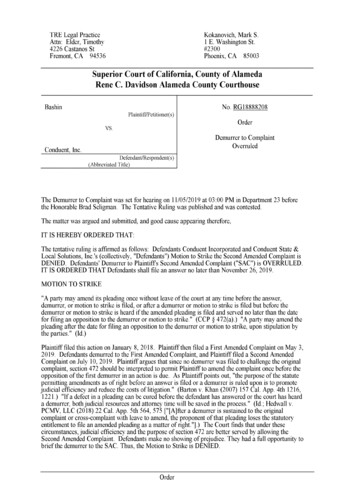
Transcription
TRE Legal PracticeAttn: Elder, Timothy4226 Castanos StFremont, CA 94536Kokanovich, Mark S.l E. Washington St.#2300Phoenix, CA 85003Superior Court of California, County of AlamedaRene C. Davidson Alameda County CourthouseBashinNo. RG18888208Plaintiff/Petitioner( s)OrderVS.Demurrer to ComplaintOverruledConduent, Inc.Defendant/Respondent( s)(Abbreviated TitleThe Demurrer to Complaint was set for hearing on 11/05/2019 at 03 :00 PM in Department 23 beforethe Honorable Brad Seligman. The Tentative Ruling was published and was contested.The matter was argued and submitted, and good cause appearing therefore,IT IS HEREBY ORDERED THAT:The tentative ruling is affirmed as follows: Defendants Conduent Incorporated and Conduent State &Local Solutions, Inc.'s (collectively, "Defendants") Motion to Strike the Second Amended Complaint isDENIED. Defendants' Demurrer to Plaintiffs Second Amended Complaint ("SAC") is OVERRULED.IT IS ORDERED THAT Defendants shall file an answer no later than November 26, 2019.MOTION TO STRIKE"A party may amend its pleading once without leave of the court at any time before the answer,demurrer, or motion to strike is filed, or after a demurrer or motion to strike is filed but before thedemurrer or motion to strike is heard if the amended pleading is filed and served no later than the datefor filing an opposition to the demurrer or motion to strike." (CCP § 472(a).) "A party may amend thepleading after the date for filing an opposition to the demurrer or motion to strike, upon stipulation bythe parties. " (Id.)Plaintiff filed this action on January 8, 2018. Plaintiff then filed a First Amended Complaint on May 3,2019. Defendants demurred to the First Amended Complaint, and Plaintiff filed a Second AmendedComplaint on July l 0, 2019. Plaintiff argues that since no demurrer was filed to challenge the originalcomplaint, section 472 should be interpreted to permit Plaintiff to amend the complaint once before theopposition of the first demurrer in an action is due. As Plaintiff points out, "the purpose of the statutepermitting amendments as of right before an answer is filed or a demurrer is ruled upon is to promotejudicial efficiency and reduce the costs oflitigation. 11 (Barton v. Khan (2007) 157 Cal. App. 4th 1216,1221.) "If a defect in a pleading can be cured before the defendant has answered or the court has hearda demurrer, both judicial resources and attorney time will be saved in the process." (Id.; Hedwall v.PCMV, LLC (2018) 22 Cal. App. 5th 564, 575 ["[A]fter a demurrer is sustained to the originalcomplaint or cross-complaint with leave to amend, the proponent of that pleading loses the statutoryentitlement to file an amended pleading as a matter of right. " ].) The Court finds that under thesecircumstances, judicial efficiency and the purpose of section 472 are better served by allowing theSecond Amended Complaint. Defendants make no showing of prejudice. They had a full opportunity tobrief the demurrer to the SAC. Thus, the Motion to Strike is DENIED.Order
DEMURRERThis qui tarn action was filed by Plaintiff against Defendants to recover damages, civil penalties, andattorneys' fees and costs on behalf of California for Defendants' alleged violation of the California FalseClaims Act ("False Claims Act"), Government Code sections 12650(a)(l), (a)(2), and (a)(8), inconnection with a contract with the State of California Department of Parks and Recreation ("DPR") todesign, test, and maintain ReserveCalifornia.com, a public-facing website for visitors to bookcampgrounds and lodging in California State Parks. Plaintiff alleges that the website delivered byDefendants are not accessible to users who are blind or have limited vision or manual dexterity.Plaintiff Bryan Bashin ("Bashin") in his individual capacity also alleges violations of the CaliforniaUnruh Civil Rights Act ("Unruh Act") and seeks declaratory relief.STANDARD OF LAW"A demurrer tests the legal sufficiency of the factual allegations in a complaint." (Redfearn v. TraderJoe's Co. (2018) 20 Cal. App. 5th 989, 996.) The Court must determine "whether the complaint allegesfacts sufficient to state a cause of action or discloses a complete defense. " (Id.) The Court assumes"the truth of the properly pleaded factual allegations, facts that reasonably can be inferred from thoseexpressly pleaded and matters of which judicial notice has been taken. 11 (Id.) "As a general rule intesting a pleading against a demurrer the facts alleged in the pleading are deemed to be true, howeverimprobable they may be," unless the "complaint contains allegations of fact inconsistent with attacheddocuments, or allegations contrary to facts which are judicially noticed." (Del E. Webb Corp. v.Stmctural Materials Co. (1981) 123 Cal. App. 3d 593, 604.) "The court does not, however, assume thetruth of contentions, deductions or conclusions oflaw. 11 (Aubry v. Tri-City Hosp. Dist. (1992) 2 Cal.4th 962, 967.) Courts "give the complaint a reasonable interpretation, reading it as a whole and itsparts in their context." (Goncharov v. Uber Techs., Inc. (2018) 19 Cal. App. 5th 1157, 1165.) Courts"construe the complaint 'liberally . with a view to substantial justice between the parties[.]'" (Id.)"[I]f a plaintiff pleads a claim that fails to state a cause of action, a demurrer is properly sustained[.]"(Boxer v. City of Beverly Hills (2016) 246 Cal. App. 4th 1212, 1225.) "Where the complaint isdefective, '[i]n the furtherance of justice great liberality should be exercised in permitting a plaintiff toamend his [or her] complaint."' (Redfearn, 20 Cal. App. 5th at 996.) "[L]eave to amend should not begranted where . amendment would be futile." (Id. at 997.)CONDUENT INCORPORATED'S LIABILITYDefendants demur to the entire cause of action to the extent claims are asserted against ConduentIncorporated on the grounds that Conduent Incorporated is purportedly a mere holding company, whichthey assert would not be liable for the allegedly fraudulent or injurious conduct as a matter of law.Defendants contend that the only specific allegations are against Conduent State & Local Solutions,Inc., and not Conduent Incorporated, which has no business lines or individual employees.However, Defendants provide no case law stating that holding companies as a matter of law are neverliable for the types of claims asserted in this action. Indeed, in the case cited by Defendants, the issuewas whether a court had jurisdiction over a foreign investor corporation and the holding turnedspecifically on the nature of that corporation's involvement in the conduct at issue. (Sonora DiamondCorp. v. Superior Court (2000) 83 Cal. App. 4th 523, 545 [holding that a "parent's status as a mereholding company with no business operations other than the investment in the subsidiaries" isinsufficient "to make out a prirna facie case that the subsidiaries were doing business in the forum stateas the agents of the parent"].) Here, the Court must accept the allegations in the SAC as true forpurposes of a demurrer, and there are no facts in the SAC or any judicially noticeable facts that wouldrender Conduent Incorporated immune from liability as a matter of law. As Plaintiff states, his theoriesof liability turn on the alter ego, agency and availment doctrines, which are fact-specific inquiries thatshould not be determined on demurrer. Plaintiff alleges unity of operations, agency, and injustice. (SAC11 107-110) Further, the SAC asserts that Conduent Incorporated assumed the liabilities of Xerox State& Local Solutions ("Xerox") pursuant to a Separation and Distribution Agreement dated December 30,2016. (SAC 122.) Thus, the Court OVERRULES Defendants' Demurrer to the entire SAC on thisground.FIRST CAUSE OF ACTION - FALSE CLAIMS ACT & THIRD CAUSE OF ACTION DECLARATORY RELIEFOrder
Defendants demur to the first and third causes of action in the SAC on the grounds that Plaintiffpurportedly: (1) failed to plead a false or fraudulent claim submitted by Defendants; (2) failed to pleadthat Defendants knew that a claim was false or fraudulent; and (3) failed to plead that a false claim wasmaterial to DPR's payment decision.As pertinent here, one who "[k]nowingly presents or causes to be presented a false or fraudulent claimfor payment or approval" is in violation of the False Claims Act. (Cal. Gov't Code§ 1265 l(a)(l).)"The elements of fraud . are: a representation, usually of fact, which is false, knowledge of its falsity,intent to defraud, justifiable reliance upon the misrepresentation, and damage resulting from thatjustifiable reliance." (Stansfield v. Starkey (1990) 220 Cal. App. 3d 59, 72-73.) "Every element of thecause of action for fraud must be alleged in the proper manner and the facts constituting the fraud mustbe alleged with sufficient specificity to allow defendant to understand fully the nature of the chargemade." (Id. at 73.) This "'strict requirement" of pleading "necessitates pleading facts which 'show how,when, where, to whom, and by what means the representations were tendered."' (Id.) "The requirementof specificity in a fraud action against a corporation requires the plaintiff to allege the names of thepersons who made the allegedly fraudulent representations, their authority to speak, to whom theyspoke, what they said or wrote, and when it was said or written." (Tarmann v. State Farm Mut. Auto.Ins. Co. (1991) 2 Cal. App. 4th 153, 157.) However, "the requirement of specificity is relaxed when theallegations indicate that 'the defendant must necessarily possess full information concerning the facts ofthe controversy' . or when the facts lie more in the knowledge of the opposite party." (Id. at 158.)Plaintiff alleges the following: DPR published a request for proposal in January 2015 for anaccessibility-compliant website. (SAC ¶ 10.) Defendants, then doing business as Xerox, respondedwith a proposal on August 12, 2015, and promised DPR that they would deliver an accessibilitycompliant website that could be used by visitors with disabilities, including blindness. (SAC ¶¶ 2, 11.)Xerox submitted bid documents, statements and records upon which they knew DPR would rely inawarding the contract, knowing that they did not intend to conduct the design and testing activitiesnecessary to ensure that the website was accessible. (Id. ¶ 12.) DPR awarded Defendant the contracton March 30, 2016. (Id. ¶¶ 11, 50-51.) Defendants knowingly made further false representations intheir Web Design Plan and Master Testing Plan-identifying Xerox's employees, Ginger Salone and KimAnderson-including purportedly knowingly false claims that automated testers were sufficient to test foraccessibility issues. (Id. ¶¶ 13, 52-55, 57-61.) Defendants' failure to use human testers and properautomated testing tools was likely to result in a non-compliant website. (Id. ¶ 62.) DPR relied onDefendants' false representations in awarding the contract, granting approval for the project to moveforward, publishing the vvebsite, and later to pay the purportedly false claim. (Id. ¶¶ 11-13.) As of thego-live date of August 1, 2017 and to the present, the delivered website has been inaccessible to blindusers like Bashin. (Id. 1 3.)Plaintiff argues that Conduent State & Local Solutions submitted false claims when it sought paymentfor the website sixteen times between August 2017 and December 2018. (SAC ¶¶ 69,74.)Specifically, Plaintiff asserts that the request for payment certified that the website satisfied thecontractual accessibility requirements between the State and Defendants. (Id. ¶ 70.) Plaintiff claim thatConduent State & Local Solutions knowingly submitted false claims that it knew were false, or acted indeliberate ignorance o the truth or falsity of the information, or acted in reckless disregard for the truthor falsity of the information. (SAC ¶ 103.) Alternatively, Plaintiff alleges that Defendants failed totimely disclose the falsity of their claims once the falsity was discovered. (Id. ¶ 105.)Here, Plaintiff has alleged facts concerning the details of false representations purportedly made, bywhom and to whom, the knowledge of Defendants of the falsity of their statements, and details regardingthe claims for payment by Defendants. The Court finds that the above allegations are pled withsufficient particularity as to each of the elements of the claim to support a claim for violation of theFalse Claims Act. Thus, the Court OVERRULES Defendants' Demurrer to the First and Third Causesof Action on this ground.SECOND CAUSE OF ACTION - UNRUH ACT & THIRD CAUSE OF ACTION DECLARATORY RELIEFDefendants demur to the second and third causes of action in the SAC on the grounds that Bashinallegedly lacks standing to bring the Unruh Act claim and that he cannot sue Defendants, who areprivate entities, for alleged Title II violations by a public entity.Order
Under the Unruh Act, "[a]ll persons within the jurisdiction of [California] are free and equal, and nomatter what their sex, race, color, religion, ancestry, national origin, disability, medical condition,genetic information, marital status, sexual orientation, citizenship, primary language, or inunigrationstatus are entitled to the full and equal acconunodations, advantages, facilities, privileges, or services inall business establishments of every kind whatsoever." (Cal. Civ. Code § 5 l(b ).) "Whoever denies, aidsor incites a denial, or makes any discrimination or distinction contrary to Section 51 [Unruh Act] . isliable for each and every offense for the actual damages, and any amount that may be determined by ajury, or a court sitting without a jury, up to a maximum of three times the amount of actual damage butin no case less than four thousand dollars ( 4,000), and any attorney's fees that may be determined bythe court in addition thereto, suffered by any person denied the rights provided in Section 51 [.]" (Cal.Civ. Code § 52(a).)Defendants cite to one federal case, which held that a plaintiff had not been injured when "an agencywith an inaccessible Web site may also meet its legal obligations by providing an alternative accessibleway for citizens to use the programs or services, such as a staffed telephone information line." (Price v.Town of Longboat Key, Fla., (M.D. Fla. May 20, 2019) No. 819CV00591T02AAS, 2019 WL2173834, at *5.) In that case, the plaintiff "received the information he sought via thumb drive," andthe court concluded that "use of an alternative method of delivery, even if not preferred, hardlyconstitutes an injury-in-fact." (Id.)Here, Bashin contends that he has been unable to enjoy the same level of access to state parks enjoyedby people without disabilities because of the inaccessibility of the website, and has had to rely onsighted volunteers to make reservations for him during specific times. (SAC ¶¶ 79-80.) He argues thatthe alternative customer call center has limited hours from 8 a.m. and 6 p.m., and does not offer accessto program activities, benefits, and privileges equal to that available to sighted users twenty-four hoursa day through the website. (Id. ¶81.) He states that he would use the website independently to book hisregular camping trips if the website were accessible. (Id. ¶ 83.) Unlike the plaintiff in Price, who failedto allege that he "has ever been, or plans to be a resident of the Town" for which he sought information,and "apparently not even visited or has concrete plans to visit the Town," Bashin has alleged specificfacts regarding his need for access to the information on the website. (Price, 2019 WL 2173834, at *4.)Further, Bashin has alleged that he is unable to obtain the equivalent information through alternativemeans, such as the call center. Thus, the Court finds that the SAC sufficiently pled an injury-in-fact.(White v. Square, Inc. (2019) 7 Cal. 5th 1019, 1032-33 ["[A] person who visits a business's websitewith intent to use its services and encounters terms or conditions that exclude the person from full andequal access to its services has standing under the Unruh Civil Rights Act, with no further requirementthat the person enter into an agreement or transaction withthe business."].)The Court OVERRULES Defendants' Demurrer to the Second and Third Causes of Action on thisground.Defendants then demur to liability under Title II of the Americans with Disabilities Act ("ADA"),asserting that such a claim may only be asserted against a public entity. Under Title II, "no qualifiedindividual with a disability shall, by reason of such disability, be excluded from participation in or bedenied the benefits of the services, programs, or activities of a public entity, or be subjected todiscrimination by any such entity." (42 U.S.C. § 12132.) However, it is also "unlawful to coerce,intimidate, threaten, or interfere with any individual in the exercise or enjoyment of, or on account of hisor her having exercised or enjoyed, or on account of his or her having aided or encouraged any otherindividual in the exercise or enjoyment of, any right granted or protected by [the ADA]." (42 U.S.C. §12203(b).) Defendant cites no case holding that an interference claim cannot be brought by a thirdparty. But "we can envision, at least hypothetically, that there could be interference with the rights of adisabled individual by a third party." Binno v. American Bar Association (6th Cir. 2016) 826 F.3d 338,348. Here the interference alleged is manifest-the very website that is the portal to access to the publicbenefit, is unavailable to persons with disabilities. Plaintiffs allege that Defendants have interfered withBashin's rights by interfering with the DPR's ability to serve him. (Opp. at p. 10; SAC ¶¶ 115-116,122-123.)The Court OVERRULES Defendants' Demurrer to the Second and Third Causes of Action on thisground.Order
Dated: 11/05/2019Order
Nov 05, 2019 · Superior Court of California, County of Alameda Rene C. Davidson Alameda County Courthouse Bashin Conduent, Inc. Plaintiff/Petitioner( s) VS. Defendant/Respondent( s) (Abbreviated Title No. RG18888208 Order Demurrer to Complaint Overruled The Demurrer to Complaint was set for h
